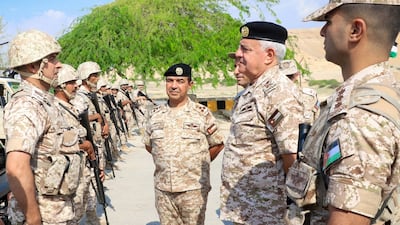Jordan's army is determined to stop the smuggling of drugs and other contraband into the kingdom, the chief of staff said on Tuesday during a visit to a border unit.
Maj Gen Yousef Al Huneiti's visit to the Third Royal Border Guards battalion came days after the military intercepted the third drone flown from Syria in a month.
“The armed forces are firmly resolute about preventing infiltration and smuggling operations, and confronting all forms of threats on the border fronts,” an army statement quoted Maj Gen Al Huneiti as saying.
The morale of border troops is high "in all their areas of responsibility", he said.
The Third Royal Border Guards battalion is in charge of areas bordering Saudi Arabia, where smugglers look to send drugs that have been moved through Jordan from Syria.
Jordan's military intercepted a drone carrying TNT on August 16, in an apparent escalation by smuggling groups operating in areas of southern Syria.
Three days earlier, a drone carrying crystal meth was intercepted as it crossed into Jordanian territory from Syria.
Another drone flown from Syria was shot down on Sunday, the military said without providing details.
Southern Syria became a main transit and manufacturing point for drugs, especially Captagon, a type of amphetamine, after the area was recaptured by the Syrian army and pro-Iranian militias in 2018.
Jordanian officials have accused them of backing traffickers.
Jordan's military has responded to smuggling attempts more swiftly and with greater firepower since 2020, as the US and the kingdom's other western allies sent hundreds of millions of dollars to upgrade its border defences.
Amman also started a rapprochement with Damascus, a move that was strengthened after Syria was readmitted to the Arab League in May.
Syria was suspended from the group in 2011 over the suppression of an uprising against President Bashar Al Assad that led to the country's civil war.
Although Mr Al Assad has regained large parts of the country with support from Iran and Russia, his government is struggling to cope with a collapsing economy amid international sanctions imposed over the crackdown.
In a televised interview this month, Mr Al Assad denied his government had anything to do with drug smuggling.
He blamed the narcotics trade on neighbouring countries that "sowed chaos" in Syria, but did not name those states.
Syrian Foreign Minister Faisal Mekdad on August 15 met representatives of an Arab League committee comprising Saudi Arabia, Egypt, Jordan, Iraq and Lebanon, which was formed to follow up on the normalisation of ties with Damascus.
In an official declaration after the meeting, the five countries said they “look forward to continued and intensified” anti-narcotics co-operation with Damascus.
Jordan wants greater co-operation from Syria before it agrees to support Mr Al Assad in his efforts to have western sanctions lifted and to obtain funding for reconstruction projects.

